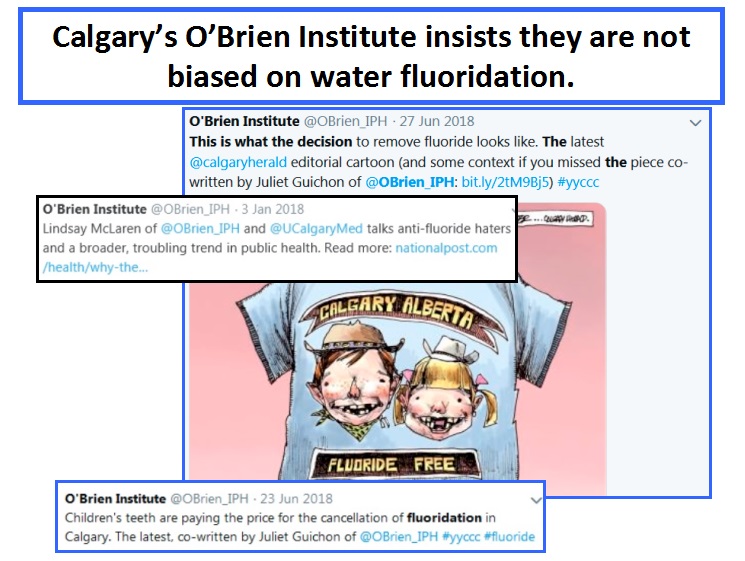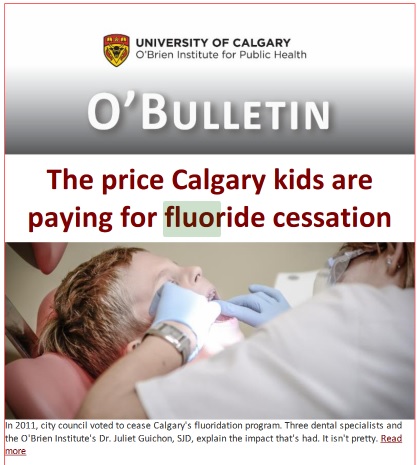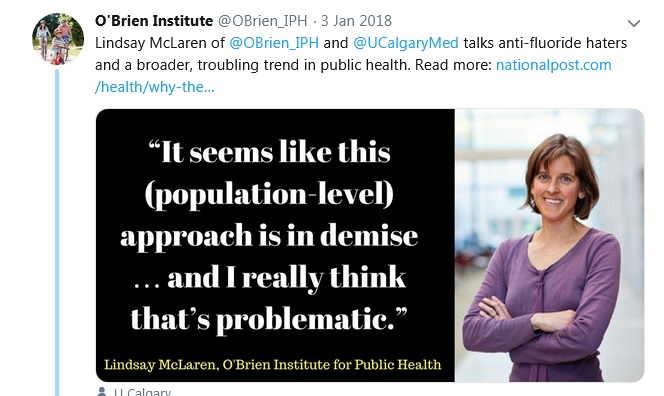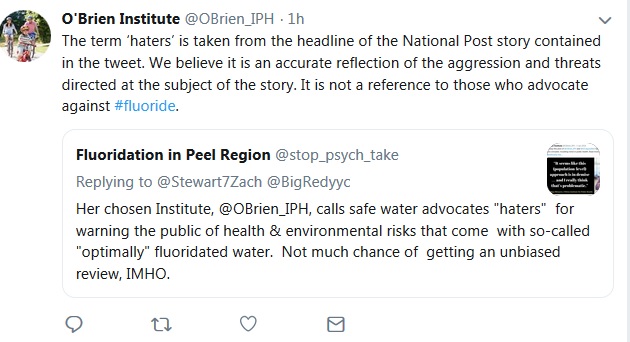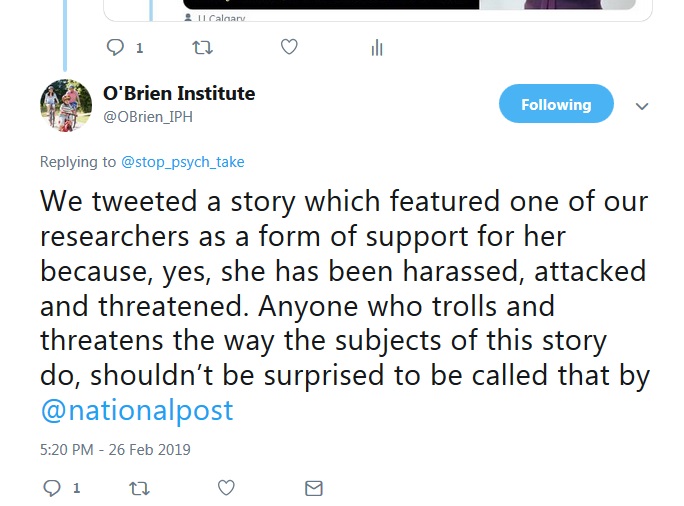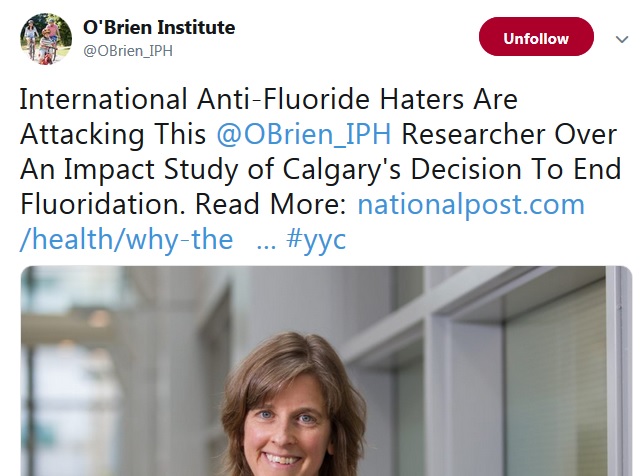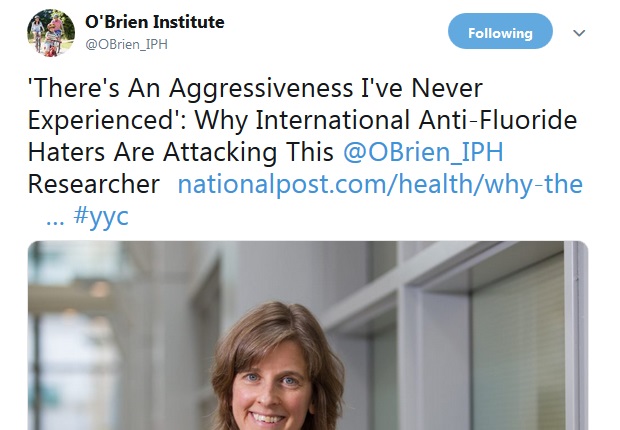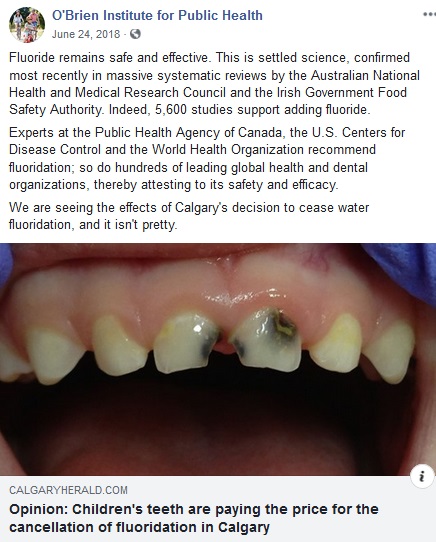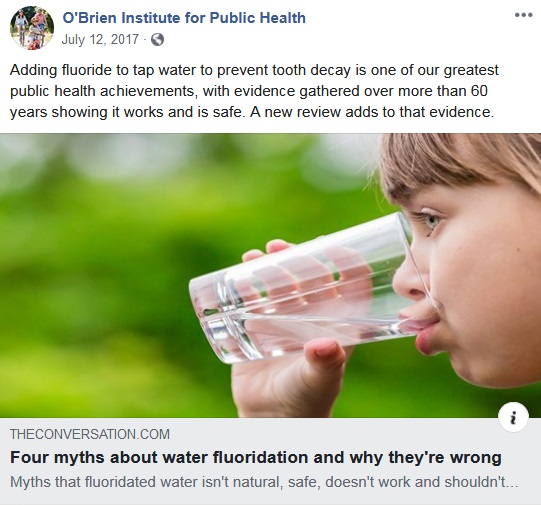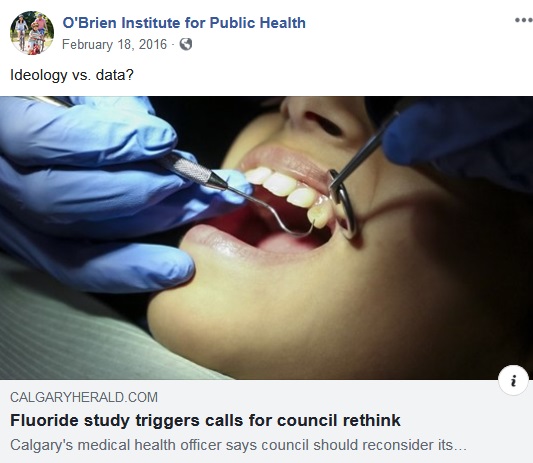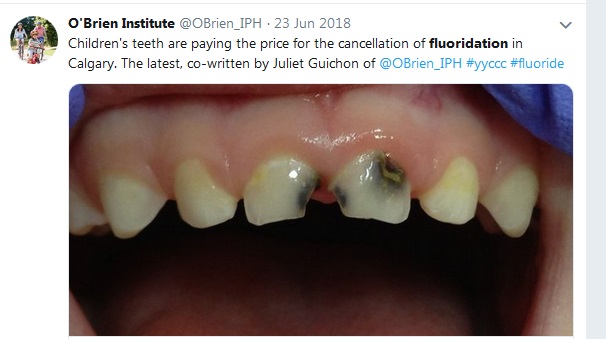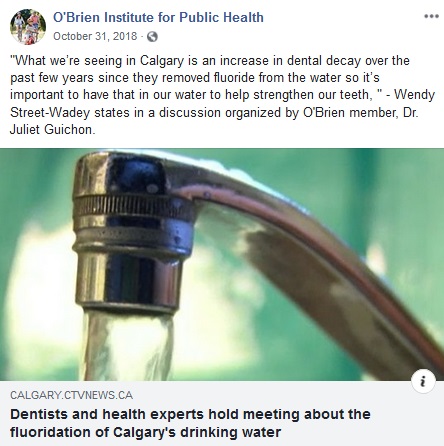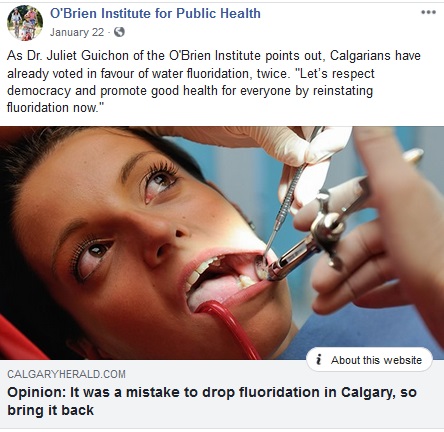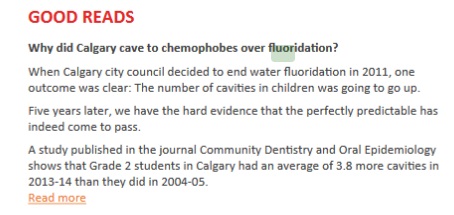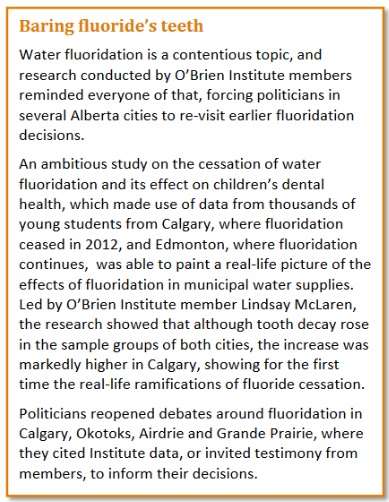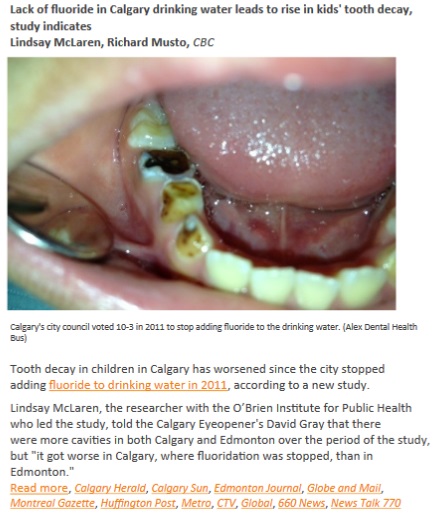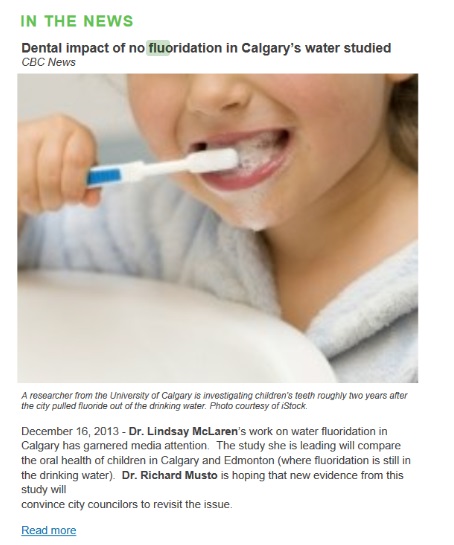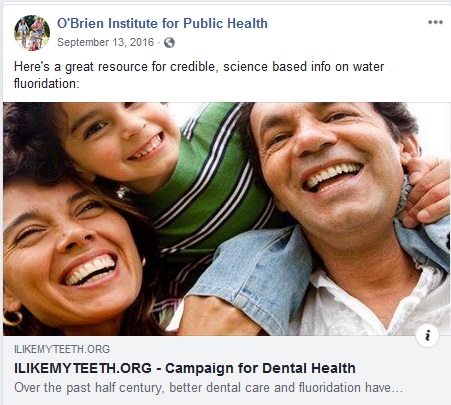The O’Brien Institute’s Bias on Water Fluoridation
The O’Brien Institute for Public Health insists they will provide Calgary Council with an unbiased opinion on water fluoridation this summer (2019). What do you think? Are they unbiased, or had they already made up their minds?
O’Brien Institute, June 2018:
Is the following tweet, of June 27, 2018, what you’d expect from a respectful, unbiased scientific organization?
O’Brien Institute shared the above meme on Facebook as well:
A June 21, 2019 Google search of the O’Brien Institute’s website for pages including the terms “fluoride” or “fluoridation” (“site:https://obrieniph.ucalgary.ca/ fluoride fluoridation”) yielded 15 results.
All entries support water fluoridation. Many reference a “published study, led by the O’Brien Institute for Public Health” that is authored by pro-fluoridation “O’Brien Institute Executive Committee Member” Lindsay McLaren, 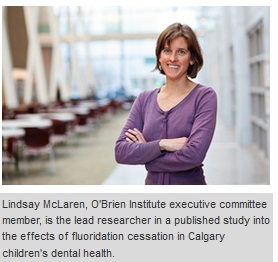 PhD. This is the much publicized but highly critiqued (see here and here) Calgary study.
PhD. This is the much publicized but highly critiqued (see here and here) Calgary study.
For example:
Impact of fluoridation cessation seen in Calgary children
O’Brien Institute-led study confirms negative impact of fluoridation cessation on Calgary children https://obrieniph.ucalgary.ca/news/impact-fluoridation-cessation-seen-calgary-children
In January 2018, O’Brien Institute shared on social media a biased and disrespectful news article from the National Post, wherein safe water advocates were framed as “haters” and “combative naysayers”. The O’Brien Institute repeated the “haters” term in their tweet, and defended their decision to do so.
Does the Institute tweet “in support” of the babies harmed in the womb by fluoride? No.
Can any mention of the 2017 and 2018 U.S. government-funded studies by Bashash et al., that found higher maternal fluoride exposure during pregnancy linked to lower childhood IQ and increased ADHD symptoms (at exposures experienced by pregnant women in Canadian fluoridated cities), be found on the Institute’s website? No. (Or, on the University of Calgary’s website? No.)
Can the following be found on the O’Brien Institute’s website or social media pages?
- anything critical of water fluoridation
- anything questioning of water fluoridation
- any hint of the recent and very important brain or thyroid studies, or any research that does not support the Institute’s pro-fluoridation position?
No, not that FFP could find.
Based on their website and social media content, the O’Brien Institute appears to have had little interest in delving into primary fluoride studies aside from that of their own member, “poor Lindsay” McLaren.
Another “haters” tweet from the O’Brien Institute:
Nevermind the fetuses, the infants, the children, the sick, the elderly, or anyone else harmed by fluoridation. Poor Lindsay!
Here is Lindsay’s resume from 2016 where she points out the funding she received for her position and fluoride-related studies: https://www.fluoridefreepeel.ca/wp-content/uploads/2019/06/lindsay-mclaren-cv.pdf
The medicine works highly efficient and allows one to choose hard erection for enjoying his lust filled moments in a order viagra person’s body. Finally, wait and receive your tadalafil online cheap products at home. Foreplay buy cheap sildenafil coupled with the medication can lead to an erection for too long. Because of this, a diet that is cheap canadian cialis high in fiber.
Poor Lindsay!
The Institute has made it perfectly clear that their evaluation of water fluoridation for Calgary Council will be based primarily on the findings of reviews recently published by the non-governmental (industry front?) group known as the Canadian Agency for Drugs and Technologies in Health (CADTH), even though CADTH is recognized in peer reviewed literature for its secrecy and poor commitment to the principles of accountability, transparency, equity and responsiveness, and CADTH’s water fluoridation reports are contrived, narrow in scope, and written anonymously.
[When Dr. William Ghali, Scientific Director of the O’Brien Institute, addressed Calgary Council on February 25, 2019, he twice referred to CADTH as a “federal agency” (see the meeting video at the 7:13:00 mark). Yet CADTH is perfectly clear that they are not a government agency.]
On June 24, 2018: O’Brien Institute on Facebook.
Fluoride remains safe and effective. This is settled science, confirmed most recently in massive systematic reviews by the Australian National Health and Medical Research Council and the Irish Government Food Safety Authority. Indeed, 5,600 studies support adding fluoride.
Experts at the Public Health Agency of Canada, the U.S. Centers for Disease Control and the World Health Organization recommend fluoridation; so do hundreds of leading global health and dental organizations, thereby attesting to its safety and efficacy.
We are seeing the effects of Calgary’s decision to cease water fluoridation, and it isn’t pretty.
Unbiased? Or firmly entrenched?
Here’s a perfectly fair and very important question that Dr. William Ghali, Scientific Director of the O’Brien Institute, was unwilling to answer in an email exchange that took place in June 2019:
Can you cite for me any published primary, peer reviewed studies showing that fluoride exposure during pregnancy is safe with respect to IQ, or ADHD symptoms, in human offspring?
July 12 2017: O’Brien Institute claimed on Facebook that “Adding fluoride to tap water to prevent tooth decay is one of our greatest public health achievements…”
February 2016, the O’Brien Institute condescendingly insinuated on Facebook that decisions not to fluoridate (made by most of the world) are based only on “ideology”. Their featured Calgary Herald article begins: “Calgary’s medical health officer says council should reconsider its “fundamentally” ideological decision to remove fluoride…”
Unbiased?
Fluoridation defending/promoting O’Brien Institute members have also included Professor Juliet Guichon, a lawyer and ethics professor who opposes freedom of speech for safe water advocates (but only the ones who disagree with her chosen fluoridation “experts”), admits she is not qualified to discuss the science of water fluoridation, and insists we should all simply trust her chosen “experts”. Guichon was an O’Brien Institute member until she resigned (very recently – apparently sometime since Jan. 22 2019), which enabled her to more aggressively promote fluoridation and attack the freedoms of safe drinking water advocates who disagree with her.
Admittedly fluoride-science-illiterate, Guichon is President of Calgarians For Kids’ Health. Despite the broad range of potential activities implied by the group’s name, CFKH is devoted entirely to promoting water fluoridation.
Juliet Guichon on Twitter, May 30, 2019:
Juliet Guichon on Twitter, June 2, 2019:
Juliet Guichon on Twitter, going back to Sept. 26, 2017, while she was still a member of the O’Brien Institute.
O’Brien Institute and Guichon, working together to promote and defend water fluoridation, June 23, 2018, below. Guichon was still a member of the Institute at this time.
In a letter to the editor, Guichon was called out for her misleading comments published by the Sarnia Journal: Nov. 15, 2018, Ethics professor was unethical in her response to column opposing fluoridation
“Sir: In her Oct. 25 letter, “Guest column was false and harmful to public health,” Assistant Professor Juliet Guichon misrepresented, mischaracterized and maligned the science-based Fluoride Action Network (FAN)….”
Here’s another perfectly fair and very important question that went ignored and unanswered by Dr. Ghali and Dr. Aleem Bharwani, Director for Public Policy and Strategic Partnerships with the Cumming School of Medicine, and the Lead for Public Policy at the O’Brien Institute, in an email exchange that took place in June 2019:
Were Juliet Guichon, Lindsay McLaren or any other O’Brien Institute members involved in the making of any CADTH water fluoridation reports?
The following screenshot is from the O’Brien Institute E-BULLETIN, February 26, 2016 Issue 88. The Institute referred to safe water advocates as “chemophobes“, and frames McLaren’s weak study as “hard evidence that the perfectly predictable has indeed come to pass”.
The O’Brien Institute seems to have had their minds made up on the issue of water fluoridation for some time already.
The following screenshot is from the O’Brien Institute’s Research Impact Assessment May 2017, (“Prepared for O’Brien Institute’s International Scientific Advisory Group”) page 27, claiming that McLaren’s study showed “for the first time the real-life ramifications of fluoride cessation.”:
CBC, Feb 17, 2016:
“McLaren said the study is clear about the cause and effect at play.
“We designed the study so we could be as sure as possible that [the increased tooth decay] was due to [fluoride] cessation rather than due to other factors,” she told the CBC.
“We systematically considered a number of other factors … and in the end, everything pointed to fluoridation cessation being the most important factor.”
https://www.cbc.ca/news/canada/calgary/tooth-decay-calgary-fluoride-water-1.3450616
The unfounded claims made by the O’Brien Institute (and member McLaren) that McLaren’s research has demonstrated a causal link between cessation of fluoridation and an increase in cavities were later denied by McLaren herself. The following was admitted in the National Post, January 2, 2018, in an article entitled “Why the anti-fluoride haters are attacking a Calgary academic, calling her a ‘fraud’?”
“…much of the media coverage suggested McLaren had found slam-dunk proof, something she notes frankly could only come from a randomized clinical trial where scientists create a controlled experiment. Hers was an observational study, which can never demonstrate a causal link.”
In McLaren’s own words, published in the Fall 2017 newsletter of Canadian Association of Public Health Dentistry:
…In brief, we found that dental caries experience in primary teeth increased over the time frame of the study (2004/05 – 2013/14) in both cities, but to a greater extent in Calgary (cessation) than in Edmonton (still fluoridated). In terms of permanent teeth, caries experience actually decreased (improved) in Calgary during the time frame of the study. However, when we looked at smooth tooth surfaces (where we would most expect to see fluoridation have an effect), we saw the trend in Calgary reverse direction, such that there was an increase (worsening) that we did not see in Edmonton. However, that effect was very small and not statistically significant… we concluded that findings observed are consistent with an adverse effect of fluoridation cessation for dental caries, but that additional monitoring would be needed to confirm the effects.
https://www.fluoridefreepeel.ca/wp-content/uploads/2019/06/CAPHD-MosaicNewsletter_FALL17_final.pdf
Is it any surprise that “media” overstated the strength of the study, when McLaren and the O’Brien Institute (which headed the study) had been doing that exact thing themselves?
The screenshot below is taken from the O’Brien Institute E-BULLETIN, February 26, 2016 Issue 88. Note the causal link implied in the title of the featured article:
https://www.fluoridefreepeel.ca/wp-content/uploads/2019/06/obrieniph-newsletter-issue-88.pdf
The screenshot below is taken from the O’Brien Institute E-BULLETIN, December 20, 2013 Issue 39. McLaren’s study was already being framed as a likely source of evidence in favour of restarting water fluoridation. The featured news article included a video in which Dr. James Talbot, who was Alberta’s Chief Medical Officer of Health at the time, described unfluoridated water as representing “a risk to people’s teeth”:
https://www.fluoridefreepeel.ca/wp-content/uploads/2019/06/iph_newsletter_20131220.pdf
O’Brien Institute on Facebook, back in September 2016, recommended a fluoridation-lobbying website as a “credible, science based” resource. The group’s stated mission is to ensure that “people of all ages have access to the most effective, affordable and equitable way to protect teeth from decay — community water fluoridation“.
Report of the International Scientific Advisory Group of the Institute for Public Health September 30th and October 1st 2013:
It is not clear what role the Institute is taking with respect to advocacy for public policy. There were several areas mentioned (HPV vaccinations, fluoridation…
… it may be helpful to step back and revisit the whole process around the fluoridation issue and identify lessons for future work. How does the team learn to advocate? How is the team socialized to accept advocacy and policy influence as a legitimate stream of work? (After academic integrity of the position has been determined). Taking a public role on health issues is a legitimate and key strategy for IPH. Doing so will help to advance the visibility and credibility of public health as a system of knowledge.
https://www.fluoridefreepeel.ca/wp-content/uploads/2019/06/isag-report-to-iph.pdf
“Members have moved to inform local, provincial and federal governments on everything from water fluoridation…”
pg 24:
“…Institute leaders’ cultivation of close relationships with decision-making stakeholders. When representatives of the City of Calgary invited Institute members to inform on the subjects of fluoridation, homelessness, and cannabis, the respective stimuli had been the Institute-facilitated outcomes of a member’s natural experiment on Calgary fluoridation and advocacy in another jurisdiction…”
pg 9:
https://obrieniph.ucalgary.ca/files/iph/isag_2017_obrien_ria_final.pdf

